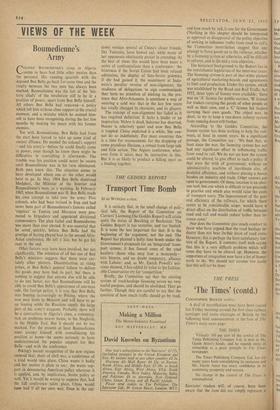VIEWS OF THE WEEK
Boumedienne's Army
COLONEI BOUMEDIENNE'S coup in Algeria seems to have had little other motive than the personal. His running quarrels with the deposed Ben Bella go back for some time and the rivalry between the two men has always been marked. Boumedienne was the last of the 'his- toric chiefs' of the revolution still to be in a position of power, apart from Ben Bella himself. All others Ben Bella had removed—a policy which left him without close support at the crucial moment, and a mistake which he seemed him- self to have been recognising during the last few months by making his peace with his former enemies.
Yet with Boumedienne, Ben Bella had from the start been forced to take up some kind of uneasy alliance. He needed the colonel's support —and his army's—before he could finally come to power, even though he knew there might be difficulties in controlling it afterwards. The trouble was his position could never be secure until Boumedienne was in his turn eliminated. Both men knew this. The situation seems, to have developed where one or the other would have to go. In May 1964 Ben Bella dismissed Medgheri, the Minister of the Interior and Boumedienne's man, as a warning. In February 1965, when Boumedienne was ill, Ben Bella made his own attempt to take over the army. Five colonels who 'had been trained in Iraq and had never been part of Boumedienne's famous exiled 'regulars' in Tunisia and Morocco were pro- moted to brigadiers and appointed divisional commanders. The plan failed and Boumedienne was more than ever alerted. It was essential that he acted, quickly, before Ben Bella had the prestige of having played host to the second Afro- Asian conference. He, left it late, but he got his man in the end.
Othei factors may have been involved, but not significantly. The retention of all but one of Ben* Bella's ministers suggests that there were cer- tainly other plotters. Dissatisfaction at rising prices, at Ben Bella's general failure to deliver the goods may have had its part, but there is nothing to suggest that anyone else will be able to do any better, nor that Boumedienne will be able to avoid Ben Bella's appearance of one-man rule. On foreign policy, it is true that Ben Bella was leaning increasingly to Peking, where the new man leans to Moscow and will have to go' on leaning while the Russians supply the large part of his army's weapons. Probably there will be a contraction in Algeria's aims, a concentra- tion on problems nearer home, in the Maghreb, in the Middle East. But it should not be too marked. For the present at least Boumedienne must occupy himself with consolidating his position at home—he seems seriously to have underestimated the popular support for Ben Bella—and with the conference.
Peking's instant recognition of the new regime ensured 'that, short of civil war, a conference of a kind would take place. China wants it badly and her motive is plain to see : she wants sup- port in denouncing American policy wherever it is applied, and, by implication, Soviet policy as well. Yet it would be wrong to suppose that, had the full conference taken place, China would have had it all her own way. Even in the cut-
down version several of China's closer friends, like Tanzania, have bowed out, while many of her opponents obstinately persist in attending. At the best of times this would have been more a series of confrontations than a conference : the bitterness if the Soviet Union had been refused admission, the display of Sino-Soviet polemics if she had gained it, the resentment at Indo- nesia's peculiar version of non-alignment, the readiness of delegations to sign communiqués they haste no intention of sticking to, the pre- tence that Afro-Asianness is somehow a way of resisting a cold' war that in the last few years has totally changed its character, and its players.
The concept of non-alignment has faded as it has required definition. It lacks a leader or an inspiration. Nehru is dead, Sukarno has deserted, Nasser is relatively quiet and now Ben Bella is toppled. China exploited it a while. She can- not do so indefinitely. For most countries this is a time for reassessment, for the dropping of some grandiose illusions, a retreat from large talk and little action. The Algiers conference, what- ever form it takes, may be instructive in this. But it is as likely to produce a falling apart as a binding together.






































 Previous page
Previous page